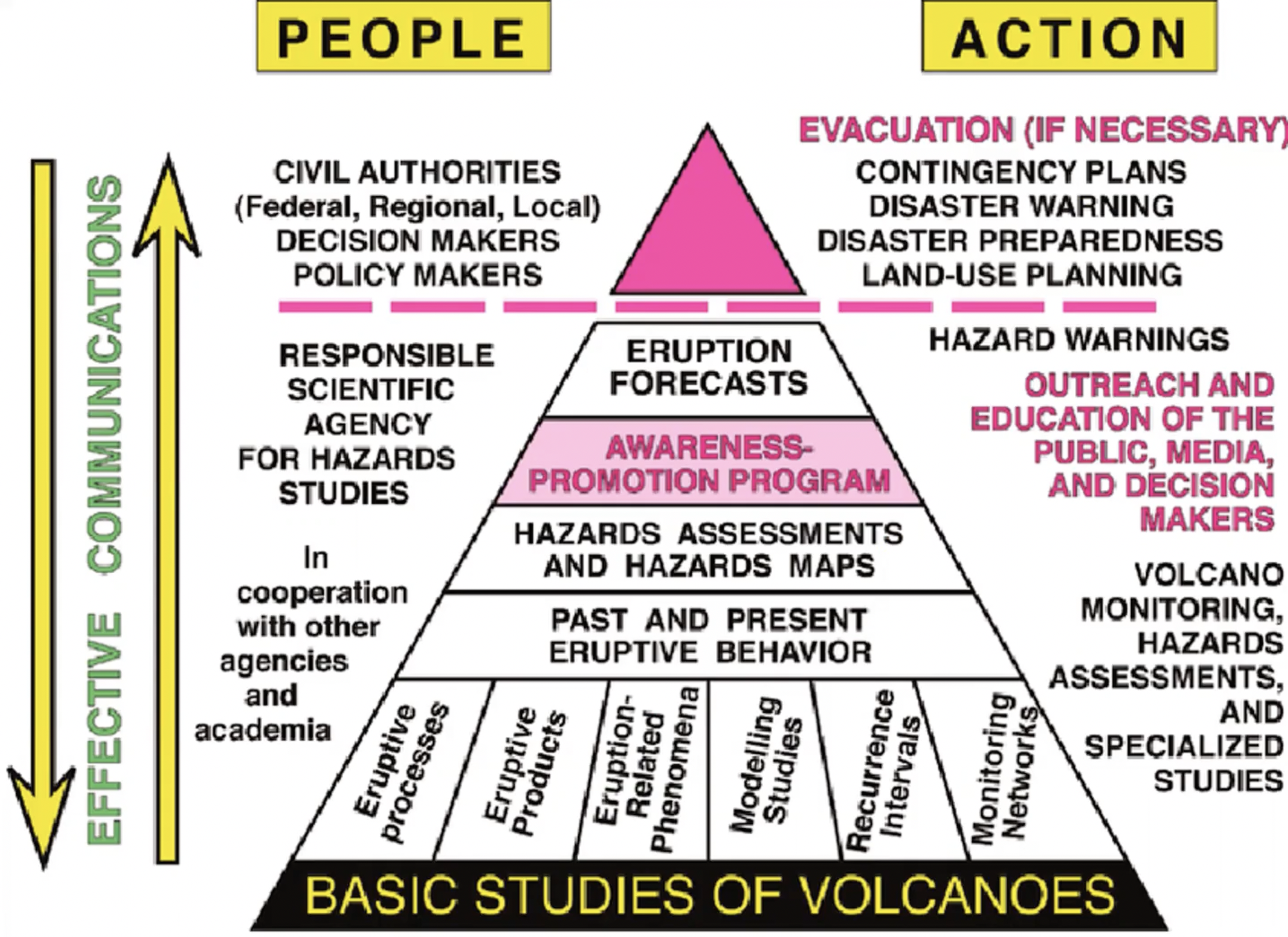
Volcanic Hazards
Volcanic Hazards
Volcanic hazard: a danger to people, property, or the environment created directly or indirectly by volcanic activity
Types of volcanic hazards:
Landslides
Tsunamis
Ash falls
Hot ash flows
Pyroclastic flows
Mudslides
Lava flows
Release of gas
Fiery clouds
Nuée ardente
Key terms
Exposure: people and property at risk to volcanic phenomena
Volcanic threat: the qualitative risk of a volcano to people and property
Mitigation Methods
Identification of hazardous areas
Monitoring of hazardous areas
Development of emergency plans for people residing in hazardous areas
Eg. evacuation

Common Precursors to Volcanic Hazards
Rising earthquake swarms
Ground surface movement
Increased presence of [abnormal] gases in the atmosphere
Variant temperatures
Collecting Information
Risk Knowledge
Systemic collection of information and undertaking of risk assessments
Are hazards and vulnerabilities well known?
Do patterns and trends exist in these factors? If so, what are they?
Are risk maps and data widely available?
Monitoring and Warning Services
Development of hazard monitoring and early warning services for people residing in the affected area
Which parameters are being monitored and why?
Is there a sound scientific forecasting system?
Can accurate and timely warnings be generated?
Dissemination and Communication
Communication of risk information and dispersion of early warnings
Do warnings quickly and effectively reach everyone at risk?
Are the risks and warnings understood by those reached?
Is warning information clear and applicable?
Response Capability
Creation of national and community response capabilities
Are response plans up-to-date and regularly tested?
Are local capacities of knowledge utilized to their full extent?
Are people prepared to react to warnings?
Volcanic Hazards
Volcanic Hazards
Volcanic hazard: a danger to people, property, or the environment created directly or indirectly by volcanic activity
Types of volcanic hazards:
Landslides
Tsunamis
Ash falls
Hot ash flows
Pyroclastic flows
Mudslides
Lava flows
Release of gas
Fiery clouds
Nuée ardente
Key terms
Exposure: people and property at risk to volcanic phenomena
Volcanic threat: the qualitative risk of a volcano to people and property
Mitigation Methods
Identification of hazardous areas
Monitoring of hazardous areas
Development of emergency plans for people residing in hazardous areas
Eg. evacuation

Common Precursors to Volcanic Hazards
Rising earthquake swarms
Ground surface movement
Increased presence of [abnormal] gases in the atmosphere
Variant temperatures
Collecting Information
Risk Knowledge
Systemic collection of information and undertaking of risk assessments
Are hazards and vulnerabilities well known?
Do patterns and trends exist in these factors? If so, what are they?
Are risk maps and data widely available?
Monitoring and Warning Services
Development of hazard monitoring and early warning services for people residing in the affected area
Which parameters are being monitored and why?
Is there a sound scientific forecasting system?
Can accurate and timely warnings be generated?
Dissemination and Communication
Communication of risk information and dispersion of early warnings
Do warnings quickly and effectively reach everyone at risk?
Are the risks and warnings understood by those reached?
Is warning information clear and applicable?
Response Capability
Creation of national and community response capabilities
Are response plans up-to-date and regularly tested?
Are local capacities of knowledge utilized to their full extent?
Are people prepared to react to warnings?
 Knowt
Knowt
